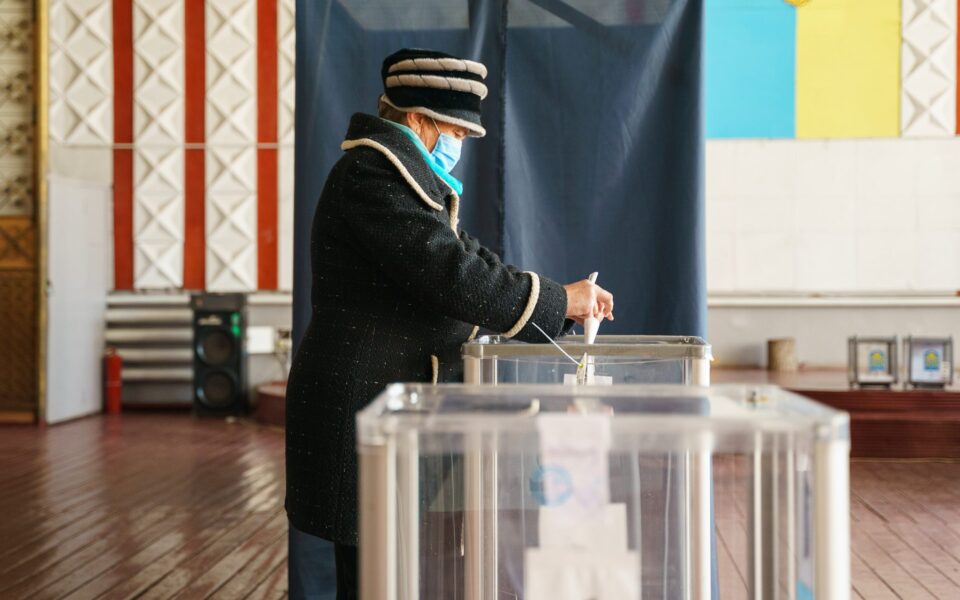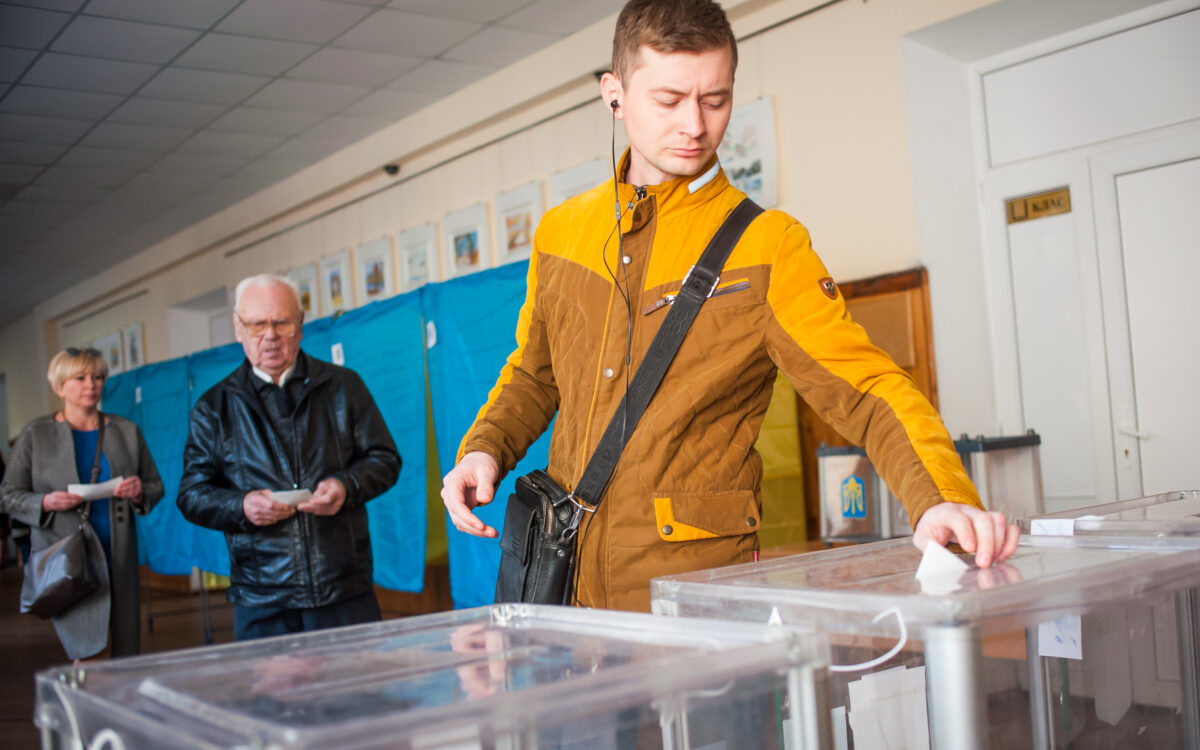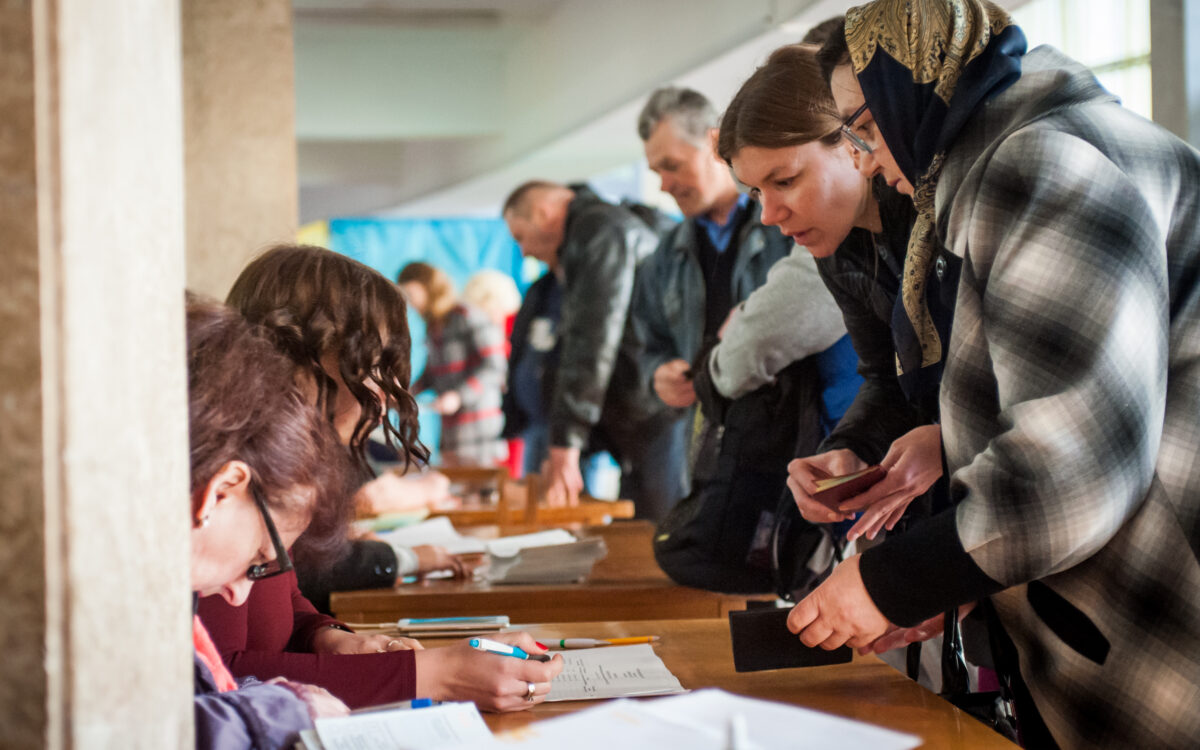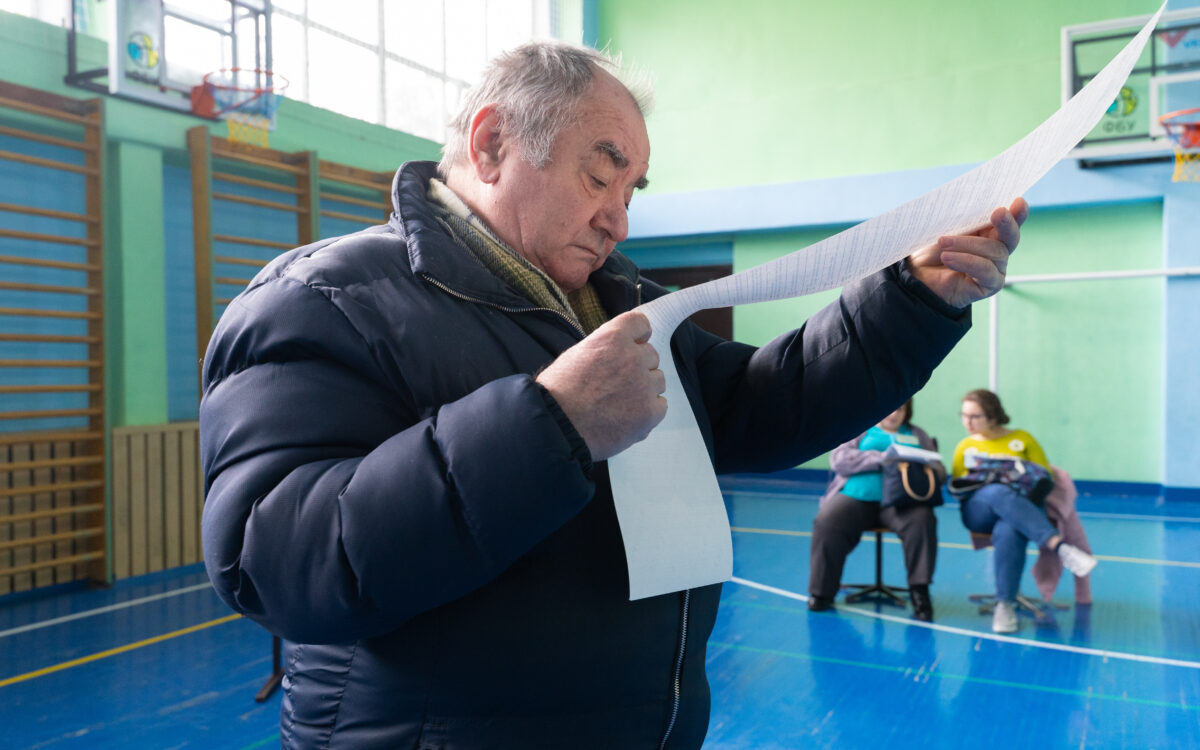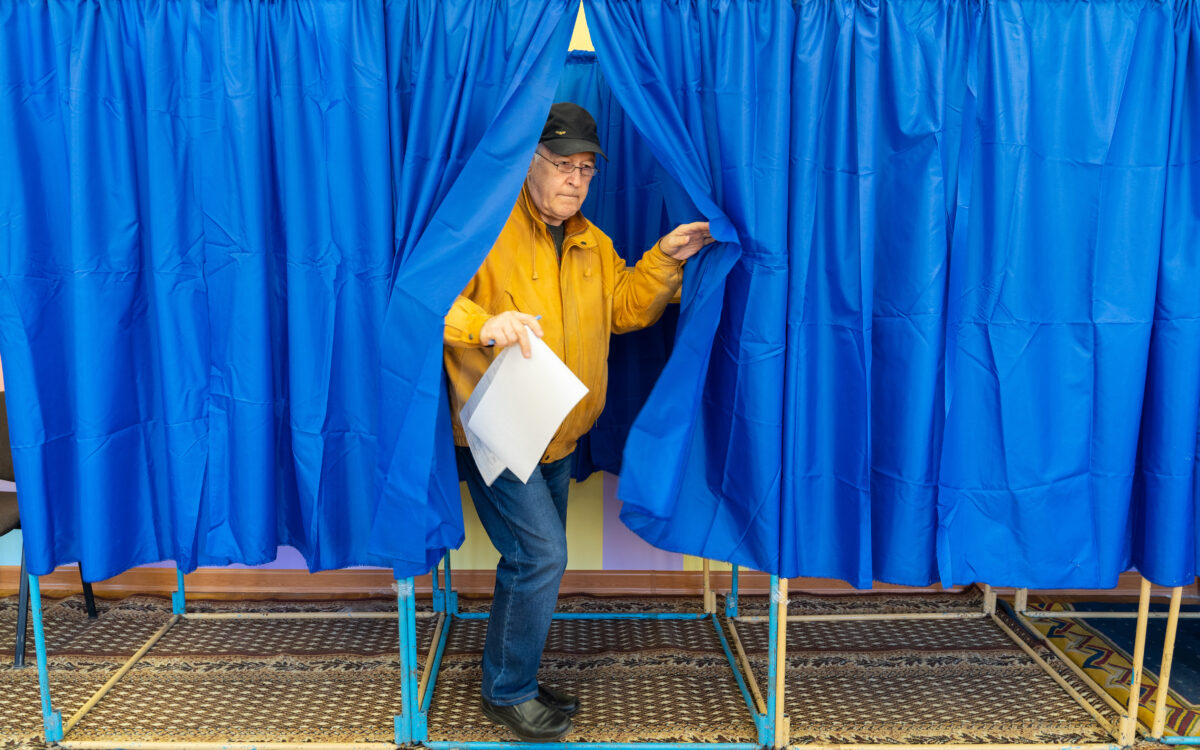
Out-of-Country Voting for Post-War Ukraine, Technical Assessment
25.05.2023
National and International Electoral Stakeholders Discuss Future Postwar OCV in the European Parliament
09.06.2023MP Introduces Legislation Dismissing CEC Members Nominated by Banned Opposition Platform – For Life Faction. On May 29, independent MP Antonina Slavytska – formerly of the banned Opposition Platform for Life political party faction – registered Draft Law Number 9335, which would dismiss Central Election Commission (CEC) members nominated by the Opposition Platform for Life faction. The Draft Law establishes that the authority of a CEC member is terminated if a parliamentary faction group nominating the member for consideration by the Verkhovna Rada is legally dissolved.
The Parliament’s Chief Scientific and Expert Department has not yet released its review of the draft law for compliance with the Constitution and other laws of Ukraine. In IFES’ view, the draft law risks contradicting the constitutional ban on introducing legislation with retroactive force and violating the rule of law by introducing the principle of collective guilt.
Technical Assessment – Out-of-Country Voting for Post-War Ukraine. Recognizing challenges related to the organization of post-war, out-of-country voting and the importance of planning in advance of elections, IFES Ukraine initiated a technical assessment that presents international experience and good practice in out-of-country voting (OCV). The assessment offers recommendations for Ukraine which will ultimately need to be considered by Ukraine’s lawmakers and election administrators to ensure the millions of Ukrainian voters currently abroad will have an opportunity to cast their votes in Ukraine’s post-war elections.
Russia’s unprovoked and unjustified full-scale invasion of Ukraine affected all elements of life in the country. It catalyzed an unprecedented wave of forced migration; according to estimates, from six to eight million Ukrainians were displaced by war and have been forced to leave their country. This displacement is a humanitarian catastrophe and a colossal challenge for Ukrainian electoral authorities and diplomatic and consular representations abroad.
The IFES Ukraine OCV assessment was shared with Ukraine’s Central Election Commission, Members of Parliament, Government representatives, and civil society professionals. It explores options that could be considered to expand Ukraine’s existing in-embassy, in-person voting to anticipate significant increases in voters abroad. Options such as having more than one polling station in a Ukrainian embassy, polling stations outside of diplomatic missions, postal voting, and allowing for early voting should be carefully considered from the perspective of Ukraine’s current territorial, political, and economic realities. The assessment emphasizes that electoral decisions should result from transparent and inclusive consultations involving all stakeholders.
Potential Internet Voting Through Diya. On May 18, ZN.UA published the latest Razumkov Center survey results regarding Ukrainians’ opinions on voting through the Diya app.
Almost 50 percent of respondents are skeptical about voting through an app. Twenty-one percent of respondents do not trust election result transparency. Nearly 15 percent believe that using Diya for elections violates their constitutional right to a secret ballot, and the same percentage of respondents are not registered on the app.
A majority of those who support online voting – 73.6 percent – are between the ages of 18 and 39.
The Razumkov Center conducted the survey on behalf of ZN.UA from April 28 to May 3. The sample is 2020 respondents who have the right to vote. The margin of error does not exceed 2.3 percent.
Launched in 2020, the Diya app allows Ukrainian citizens to use digital documents on their smartphones for identification and sharing. The Diya portal provides access to over 50 government services. Diya was built in partnership with the United States and will be shared with other countries.
Discussion in the European Parliament in Brussels: Ukraine’s Post-War Elections. On May 30-31, IFES Ukraine participated in an event titled Parliamentary Electoral Dialogue: Challenges and Needs for Holding Out-of-country Voting for Ukraine’s Post-war Elections, organized by the International Institute for Democracy and Electoral Assistance, or International IDEA, and the European Parliament.
In opening remarks, IFES International Senior Advisor Harald Jepsen mentioned that due to the scale of the first postwar elections, including out-of-country voting, early preparation, international support, and Ukrainian stakeholders’ proaction are fundamental.
IFES Ukraine Democracy and Governance Advisor Anna Denis presented IFES Ukraine’s Technical Assessment of Out-of-Country Voting Process which analyzes alternative voting methods to be introduced abroad and highlights the need for an inclusive consultative process, election administration capacity building and sustained stakeholder cooperation.
IFES Ukraine notes that recommendations stemming from the Technical Assessment of Out-of-Country Voting Process, shared earlier this month, were referenced throughout the discussion.
Parliamentary election dialogue participants discussed the advantages and disadvantages of various voting methods, such as postal and digital voting and personal balloting at polling stations abroad. Representatives of different countries shared their experience, discussed possible solutions for Ukraine, and assured Ukrainian representatives of their ongoing election administration support.
IFES’ partners from the Central Election Commission, the Ministry of Foreign Affairs, the Verkhovna Rada, Civil Network OPORA, the Center for Policy and Legal Reform, the USAID Rada Next Generation (RANG) Parliamentary Support Program, the European Endowment for Democracy, the Election Observation and Democracy Support, the Organization for Security and Cooperation in Europe’s Office for Democratic Institutions and Human Rights and international election management organization presented during the event.
CEC Chair Oleh Didenko’s Interview Published by POLITICO News Outlet. Following the abovementioned event in Brussels dedicated to issues of out-of-country voting and post-war elections in Ukraine, on May 5, POLITICO news outlet ran an article titled “No Russia sympathizers: Ukraine eyes postwar elections” featuring an interview with the Chair of Ukraine’s Central Election Commission, CEC, Oleh Didenko.
POLITICO notes that Ukraine was set to hold a parliamentary election in October and a presidential election next year — but preparations for both of these have been put on hold because of the war.
In the context of post-war election challenges, the CEC Chair Oleh Didenko spoke about the risks of foreign interference.
“I understand that Ukraine should ensure democratic standards when conducting postwar elections regarding the rights of being elected.” At the same time, “Ukraine needs to think [about] how to protect itself from such interference and prevent threats to the national security,” said Oleh Didenko.
Fears of Russian interference are just one of many hurdles Ukraine will face in setting up its first postwar elections, reads POLTICO article. Ukraine will also need to consider the more than 8 million Ukrainians – roughly 20 percent of the population – who have fled Russian aggression and currently live abroad and facilitate their participation in elections. However, as noted by POLITICO following Brussels discussions, the new voting model will be a political decision, as Ukraine’s parliament will take the final decision.
Read more via the link here.
Securing Elections from Digital Threats. On May 25-26, IFES representatives in Ukraine participated in a joint event in Prague for election administration bodies and global leaders addressing cyber security and technology. Participants agreed to launch the Elections Cyber Readiness Network to share information and best practices in cyber security.
CEC member Serhii Postivyi and Deputy Head of the Secretariat of the Commission for Digital Development, Digital Transformations, and Digitalization, Taras Oliynyk, conducted meetings with colleagues from Armenia, Bosnia and Herzegovina, Georgia, and North Macedonia to exchange technological development and election cyber security experience.
“Direct communication and information exchange of the CEC with technology companies that are world leaders in their segment will contribute to the improvement of planning measures for cyber security and digital transformation and increase the level of public trust in technological solutions introduced by the CEC of Ukraine,” said Mr. Postivyi.
CEC Representatives Participate in Global Anti-Corruption Integrity Forum. On May 24-25, the Organization for Economic Cooperation and Development, the OECD, held the Global Anti-Corruption and Integrity Forum in its Paris headquarters. The event focused on developing policy solutions and innovations to strengthen integrity and fight official corruption.
Participants discussed the role of integrity among elected and appointed officials, zero tolerance for corruption, countering foreign covert influence and interference in public affairs, and other topics related to integrity and anti-corruption.
The event was organized for the first time since 2020, and its participants included representatives of all OECD member countries and partners. Ukrainian CEC members Pavlo Liubchenko and Viktoriia Hlushchenko attended and participated.
Forum participant remarks focused on Ukraine and its struggle for sovereignty, territorial integrity and democratic values. They also discussed Ukraine’s experience in fighting official corruption.
Participants from different countries shared their experience in building good governance with parliamentarians and other elected officials. They also emphasized the need to support Ukraine in its fight against Russia as well as in the years of post-war reconstruction.
“Fighting corruption in Ukraine and monitoring the integrity of public officials is very important now but will become even more critical after the victory,” said Mr. Liubchenko. “Ukraine’s progress in development will depend on the integrity of politicians. Fair, democratic elections organized following the highest European standards will be a crucial contribution to forming a good government. However, the process of organizing post-war elections is particularly fraught with risks. Therefore, it is necessary to analyze such challenges and develop effective solutions for the proper organization of elections now.”
Discussion: Disinformation And Election Integrity. On May 18, the IFES Regional Europe Office held the fifth meeting of the Europe and Eurasia Working Group on Social Media, Disinformation, and Electoral Integrity, which assembled election commissions from 10 countries.
During the meeting, participants listened to the experience and best practices from regional election management bodies, or EMBs. Ukrainian CEC members Vitalii Hren and Yuliia Dudnyk of the Commission’s Secretariat participated.
The event was organized to revitalize a regional election management network established in May 2020, which supports EMBs in addressing challenges to electoral integrity and public trust posed by individuals with ill intent, social media, and general disinformation. The Working Group facilitates the exchange of information between EMBs. It provides a stable platform for sharing experiences and developing skills, best practices, and tools to counter disinformation and respond to crises.
During the meeting, Mr. Hren shared the Commission’s positive use of social media in voter education and discussed direct communication with voters during the 2020 local elections. He drew attention to challenges preparing for post-war elections, particularly in engaging Ukrainian voters abroad. In the context of post-war elections, he emphasized the need to regulate social media in election campaigning.
Mr. Hren said attention should be focused on campaign finance transparency through improved communication between the CEC, the National Agency for Corruption Prevention, and the National Council of Ukraine on Television and Radio Broadcasting.
Daria Azariev North facilitated the event, IFES Program Manager for Europe and Eurasia, and Nikoleta Dióssy, IFES Senior Program Officer in the Regional Europe Office in Prague.
Civil Society Forum Held in Ukraine. On May 30, ISAR Ednannia conducted a civil society forum titled, Shapes of the Future: Victory, Recovery, And Modernization Of Ukraine. The event was attended by representatives of Ukrainian civic and charitable organizations, volunteer initiatives, humanitarian organizations, international partners, the central government, local governments, businesses, and the news media.
ISAR Ednannia is a grant-making organization in Ukraine with over 20 years of experience and an implementing partner of the United States Agency for International Development and the EU Delegation to Ukraine. Ednannia translates to “unity” in the Ukrainian language.
The forum included:
- Panel discussions;
- Exhibition Presentations (businesses, art objects preserved from the war, and best cases of restoration of affected communities by civil society);
- Presentations of opportunities from donor organizations and the how and where to apply for grants; and,
- Workshops on the project approach, design and management, crowdfunding, work on international platforms, and strengthening civil society to restore Ukraine.
As part of the meeting in the World Cafe, Alisa Shushkovska, Head of Political and Legal Affairs at IFES Ukraine, and Serhii Savelii, Senior Specialist for Political and Legal Affairs at IFES Ukraine, they had the opportunity to discuss challenges associated with the first post-war elections and the role of civil society. Both experts presented the latest research on ensuring voting for Ukrainian citizens living abroad during the event. All participants agreed that although elections and referenda are prohibited during martial law in Ukraine, preparations for the first post-war elections should be made now because they will be the most complex electoral events in Ukraine’s history.
Training for Ensuring Gender Equality. On May 20, IFES Ukraine conducted a training titled Men as Allies for Kyiv City Council deputies. Participants discussed equal partnership of women and men at individual and institutional levels and expanded their knowledge and skills on promoting gender equality and women’s leadership.
Participants also considered and discussed the following:
- Normative and legal framework for the development of gender equality in Ukraine;
- Institutional support of equal partnership of women and men at the institutional level; and;
Reproductive and care as unpaid work.


